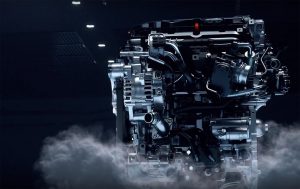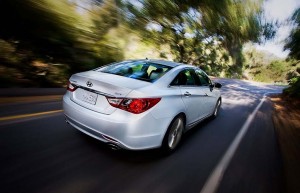According to conventional wisdom, most of the cars we’ll be driving by mid-decade will need to be electrified, in some form or another, to meet increasingly stringent mileage and emissions mandates – and many experts believe it’s only a matter of time until the internal combustion engine vanishes entirely.
But whether using gas or diesel, the time-tested IC engine is proving more resilient than expected, automotive engineers finding plenty of ways to improve its efficiency, and Hyundai Motor Group has announced what it bills as another big leap.
Dubbed the “Smartstream” turbo engine, the Korean maker claims “the world’s first continuously variable valve duration technology” not only can improve performance but reduce both emissions and fuel consumption.
“The development of the CVVD technology is a good example how Hyundai Motor Group is strengthening our powertrain technology,” said Albert Biermann, President and Head of Research and Development for the Korean car group, parent of the Hyundai, Genesis and Kia brands. “We will continue our innovation efforts to bring forth paradigm shifts and ensure sustainability of our business model.”
Hyundai is by no means the first automaker to use computer technology to adjust valve operations. But, until now, that simply meant changing the precise moment a valve would open. How long before it closed again was essentially fixed in stone. The Hyundai CVVD technology means a Smartstream engine not only can adjust when the valve opens, but how long it remains open.
(Hyundai’s product blitz helps it defy the U.S. market downturn. Click Here for the story.)
The time is shortened at higher RPMs and heavy engine loads, lengthened at lower RPMs and lesser loads.
Some might quibble with Hyundai’s claim to having a world’s first with the CVVD system, as Koeniggsegg, the Swedish supercar company, claims it also can adjust valve timing and the length of opening. But, certainly, Hyundai is the first to move it into production in the mainstream automotive market.
The automaker claims the new technology can give an engine a 4% increase in performance, while lowering emissions 12% and reducing fuel consumption by 5 percent.
The automaker plans to debut the CVVD system on a 1.6-liter inline-four turbo engine which will be used for the Sonata Turbo model. The package, which will make 180 horsepower and 195 pound-feet of torque, is set to come to market later this year.
“This premiere will mark the first in a series of new Hyundai and Kia vehicles featuring the engine,” the automaker hinted in a news release.
Hyundai is by no means the only automaker looking for dramatic breakthroughs in powertrain technology.
Nissan recently launched the VC-Turbo, or variable-compression turbo, engine which can alter its compression ratio anywhere from 8:1, for maximizing performance, up to 14:1, to improve fuel efficiency. Nissan claims the turbocharged 2.0-liter, inline-four VC-T gets about 27% better mileage than the 3.5-liter V-6 that it replaced, even though the two engines make similar amounts of torque.
Mazda, meanwhile, recently debuted the SkyActiv-X powertrain which is the closest the industry has come to perfecting a concept known as homogeneous charge compression ignition, or HCCI. Think of it as a diesel engine running on gasoline, meaning that, like a diesel, it ignites its air fuel mixture by compression, rather than using a spark. Mazda hasn’t quite pulled off the impossible. SkyActiv-X engines do use spark plugs – but they only fire under some conditions, the engine mostly functioning like a diesel, with a compression ratio of 16:1, or nearly double the normal for a gas powertrain.
Meanwhile, other new technologies are being explored, including plasma ignitions that would replace those spark plugs.
Despite such breakthroughs, most experts think the internal combustion has a limited future. But that could mean being paired with electric technology, in some form of hybrid system, rather than being phased out entirely, at least in the next decade or two.
(Click Here for more about our first drive in the 2019 Hyundai Santa Fe Ultimate.)



